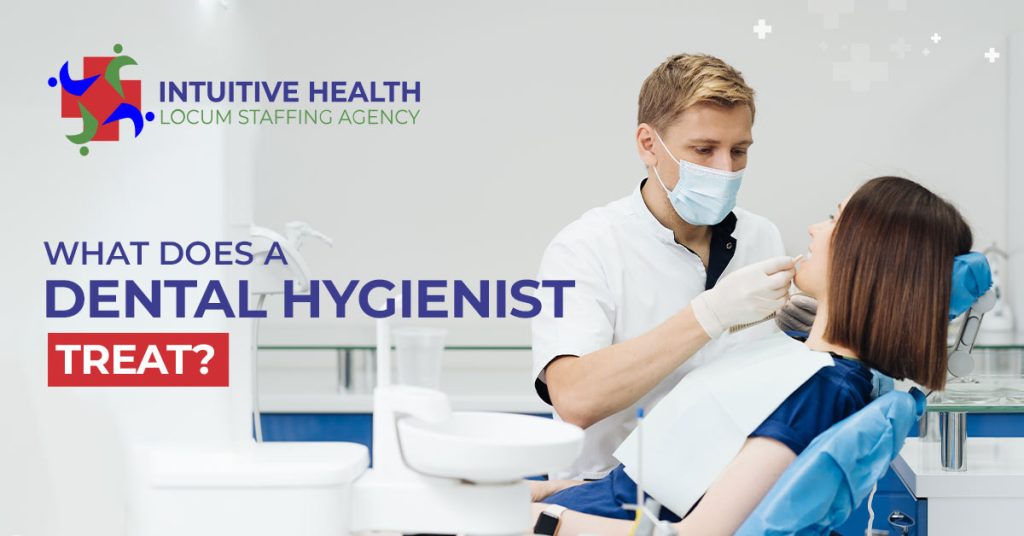When most people think of going to the dentist, they often picture cleanings, checkups, and maybe a quick polish. However, many of these critical tasks are done by a dental hygienist. In the U.S., dental hygienists play a big role in keeping your smile healthy. They help spot early signs of trouble, teach you how to care for your mouth, and even help prevent bigger problems from happening.

This blog will explain dental hygienists’ work, their education and training, and why you should regularly visit one.
What is a Dental Hygienist?
Dental hygienists, or teeth hygienists or oral hygienists, are licensed healthcare professionals who work closely with dentists to take care of your oral health. Their job is to clean teeth, look for signs of oral problems, and teach patients how to keep their teeth and gums healthy.
They do not perform surgeries or fill cavities. But they are trained to diagnose early symptoms of periodontal disease, dental decay, and even oral cancer. When they notice these issues, they refer the patient to the dentist for further evaluation and treatment.
What does a Dental Hygienist do?
Dental hygienists are often the first to notice detect early signs of oral health problems. Their training allows them to identify, manage, and prevent several issues before they become serious.
Here’s a closer look at which oral health conditions they help treat:
Gum Disease (Gingivitis and Periodontitis)
Gum diseases are extremely common in the U.S. About 42.2% of adults 30 years or older in the USA suffer from various periodontal diseases. If the condition is left untreated, it might lead to periodontitis, a more severe disease that affects the bone around teeth. Dental hygienists clean deep around the gum line to remove the buildup that causes infection. They also teach brushing and flossing techniques that protect gum health.
Plaque and Tartar Buildup
Plaque is a soft bacterial layer that naturally develops on the surface of your teeth. When it hardens into tartar, it becomes harder to remove and can lead to gum problems or decay. Hygienists use scaling tools to safely remove both, especially in hard-to-reach areas. Regular cleanings stop buildup from turning into bigger issues.
Tooth Sensitivity
Sensitive teeth react to hot, cold, or sweet foods. This sensitivity is often caused by damaged enamel, gum recession, or tiny cracks in the teeth. An oral hygienist will pinpoint the cause and offer solutions like fluoride varnishes, desensitizing products, or tips for using a softer toothbrush to avoid further damage.
Early Tooth Decay
Cavities don’t appear overnight. They often start as small white spots or soft areas on the enamel. Hygienists are trained to catch these early changes during routine cleanings. If spotted in time, decay can sometimes be reversed with fluoride or dietary changes, helping patients avoid fillings.
Bad Breath (Halitosis)
Persistent bad breath often signals poor oral hygiene or untreated gum problems. Dental hygiene professionals deep-clean the areas where bacteria build up and recommend at-home care routines that fight odor-causing bacteria. If the cause is not oral, they may refer patients to a dentist or physician.
Stained Teeth
Stains from coffee, tea, tobacco, or red wine can dull the smile over time. Dental hygienists use polishing tools and mild abrasives to remove surface stains during cleanings. While not a replacement for professional whitening, this helps teeth look cleaner and brighter after every visit.
Why Should You Regularly Visit a Dental Hygienist?
Going to the oral hygienist every six months keeps your mouth clean and healthy. Even if you brush every day, plaque can still build up. Regular visits prevent bigger problems like cavities, gum disease, and tooth loss.
In the U.S., many people wait until they are in pain to visit dental professionals. As per the CDC stats, around 35% of adults miss their yearly dental checkups and cleaning. Regular visits to the hygienist can catch problems early when they’re easier and cheaper to fix.
How to Become a Dental Hygienist?
Becoming a dental hygienist requires completing specific education and obtaining proper certification to practice legally in the United States. Here’s the typical path to enter this rewarding profession:
- First, you need to get an Associate Degree in Dental Hygiene by enrolling in a program recognized by the Commission on Dental Accreditation (CODA). These programs usually take about two to three years and include both classroom instruction and hands-on clinical training.
- After completing your degree, you must clear the National Board Dental Hygiene Examination (NBDHE), which assesses your knowledge of dental hygiene principles and practices. In addition, every state requires candidates to pass a clinical licensing exam, often called the Regional Board Exam or Jurisprudence Exam, to ensure they can safely perform dental hygiene procedures.
- Some hygienists choose to further their education by earning a Bachelor’s Degree in Dental Hygiene or a related field, which can open doors to teaching, research, or advanced clinical roles.
- Finally, dental hygienists must obtain a state license to practice, which involves meeting all education, examination, and background check requirements specific to that state.
- To maintain certification, professionals must regularly update their knowledge through continued education.
Dental hygiene is one of the most in-demand roles in the U.S. healthcare system. Depending on your location and chosen program, it may take two to four years to become an oral hygienist.
Key Skills Required to Become a Dental Hygienist
Dental hygienists need more than just medical knowledge. Here are some necessary skills to excel in the healthcare profession especially in the field of dental hygienist:
- Attention to detail: Must catch early signs of disease.
- Steady hands: Cleaning teeth requires precision.
- Good communication: Must have good communication skills to explain oral health in simple words.
- Compassion: Many patients feel nervous, so being kind and empathetic helps.
- Problem-solving: Ability to figure out or diagnose health issues, such as what’s causing issues like bad breath or bleeding gums.
Want to find high-paying jobs as a dental hygienist professional? Explore flexible career opportunities with Intuitive Health Services.
Dentist Vs Dental Hygienist: What’s the Difference?
While both dental hygienists and dentists work closely to maintain your oral health, their roles differ significantly. Dental hygienists focus primarily on preventive care, such as cleaning teeth, taking X-rays, and educating patients about oral hygiene. They focus on everyday dental tasks that promote mouth health and identify early signs of trouble.
Dentists, on the other hand, have a broader scope of practice. Their role includes diagnosing and treating complex dental issues, performing surgeries, filling cavities, and developing treatment plans. Dentists also complete more extensive education—usually earning a Doctor of Dental Surgery (DDS) or Doctor of Dental Medicine (DMD) degree—and carry greater responsibility for patient care.
Suggested Read: Locum Tenens Dentists: Pros & Cons for Your Dental Practice
Together, hygienists and dentists form a team that ensures both prevention and treatment of oral health issues helping you maintain a healthy smile for life.
Start Your Career As a Dental Hygienist with the USA’s Leading Medical Staffing Agency
Dental hygienists have an important role in patient care by preventing and treating many common oral health issues. By focusing on prevention and early care, dental hygienists help protect both your smile and your overall well-being. If pursuing a career in dental hygiene appeals to you, it offers a fulfilling path with strong job prospects and the chance to help others every day.
If you’re a dental hygienist looking for flexible and high-paying opportunities, consider partnering with an accredited healthcare staffing agency like Intuitive Health Services. We are a trusted medical staffing agency dedicated to connecting skilled dental hygienists with rewarding positions across the healthcare field. Get personalized career guidance, ongoing training and skill development, and access to top employers who appreciate your expertise.
If you’re ready to take the next step in your career and find the perfect dental hygiene role, Intuitive Health Services is here to help you succeed. Connect with our team and get started today!

